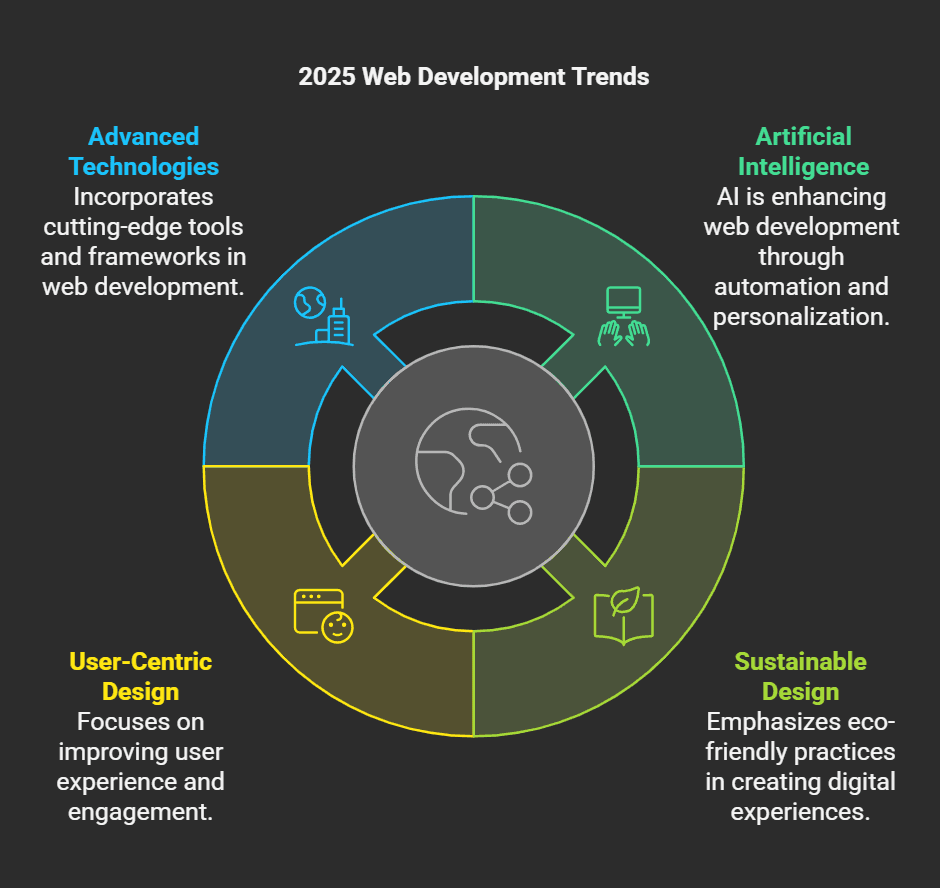Web Development Trends That Will Dominate 2025: A Complete Analysis
Explore the cutting-edge technologies and practices shaping web development in 2025...
Varritech
March 15, 2024

Web Development Trends That Will Dominate 2025: A Complete Analysis
As we progress through 2025, the web development landscape is undergoing transformative changes driven by technological advancements and evolving user expectations. From artificial intelligence to sustainable design practices, these trends are shaping how developers create digital experiences. Here’s a comprehensive analysis of the key web development trends that are set to dominate this year.

1. AI-Powered Web Development
Artificial intelligence (AI) continues to revolutionize web development by automating workflows, enhancing user experiences, and enabling dynamic personalization. Tools like GitHub Copilot and Tabnine are now standard for writing efficient code, while AI-driven platforms such as WordLift analyze user behavior to deliver tailored content. AI’s integration with edge computing and Content Delivery Networks (CDNs) further improves website performance by processing data closer to users, ensuring seamless interactions23.Key Applications:
Predictive user journey mapping
Generative content creation
Adaptive AI-driven chatbots
2. Low-Code and No-Code Platforms
Low-code/no-code (LC/NC) platforms are democratizing web development by enabling non-developers to create applications and websites. These tools accelerate time-to-market by simplifying the development process, making them ideal for startups and small businesses looking to build digital solutions quickly12.Benefits:
Reduced dependency on technical expertise
Faster prototyping and deployment
Cost-effective for small-scale projects
3. Sustainable Web Design
Sustainability is becoming a critical consideration in web development. Developers are optimizing media, streamlining code, and choosing eco-friendly hosting solutions to reduce carbon footprints. Sustainable web design aligns environmental responsibility with improved performance, resulting in faster-loading websites that enhance user satisfaction5.Key Practices:
Efficient coding techniques
Green hosting solutions
Minimalist design for reduced resource usage
4. Progressive Web Apps (PWAs)
Progressive Web Apps continue to gain traction as they offer an app-like experience through the browser without requiring downloads. PWAs are lightweight, fast, and highly responsive, making them ideal for mobile-first audiences1.Advantages:
Offline functionality
Enhanced speed and responsiveness
Cross-platform compatibility
5. Cybersecurity Innovations
With increasing cyber threats, robust cybersecurity measures are more critical than ever in 2025. Developers are adopting advanced encryption methods, multi-factor authentication (MFA), and blockchain technologies to secure sensitive data and transactions12.Emerging Trends:
Blockchain for secure data storage
AI-driven anomaly detection
Zero-trust security models
6. Motion UI and Immersive Design
Motion UI is transforming static interfaces into dynamic experiences by incorporating animations that enhance user engagement. Combined with immersive design elements like 3D graphics and parallax scrolling, these trends create visually captivating websites that stand out in competitive markets14.Popular Features:
Smooth transitions and animations
Interactive 3D elements
Storytelling through parallax effects
7. Serverless Architectures
Serverless computing is becoming mainstream as it eliminates the need for traditional server management. This trend allows developers to focus on building functionalities while cloud providers handle infrastructure scaling automatically3.Key Benefits:
Reduced operational complexity
Cost-effectiveness through pay-as-you-go models
Enhanced scalability for fluctuating traffic
8. Voice Search Optimization
With the rise of smart speakers and voice assistants, optimizing websites for voice search is essential in 2025. Voice-enabled interfaces offer hands-free convenience while improving accessibility for users with disabilities1.Optimization Strategies:
Natural language processing (NLP)
Structured data markup for better search visibility
Conversational content targeting voice queries
9. Micro Frontends
Micro frontends extend the microservices approach to frontend development by breaking down user interfaces into smaller, manageable components. This modular approach improves scalability and simplifies maintenance13.Advantages:
Independent deployment of frontend components
Enhanced team collaboration on large projects
Faster updates without affecting the entire application
10. Focus on UX/UI Enhancements
User experience (UX) and user interface (UI) remain at the forefront of web development trends in 2025. Developers are prioritizing intuitive designs, fast load times, and mobile responsiveness to meet growing user expectations4.Key Features:
Voice-enabled interfaces
Mobile-first designs with responsive animations
Accessibility improvements like video transcriptions and image captions
Preparing for the Future
The web development trends of 2025 emphasize adaptability, innovation, and sustainability. Whether it’s leveraging AI for smarter applications or adopting eco-friendly design practices, developers must stay ahead by embracing these advancements.By focusing on these trends, businesses can create engaging, secure, and future-proof digital experiences that cater to evolving user needs while maintaining a competitive edge in an ever-changing digital landscape.